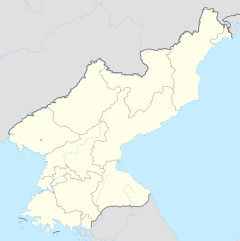Chungsan concentration camp
| Chungsan concentration camp | |
| Chosŏn'gŭl | 증산 제11호교화소 |
|---|---|
| Hancha | |
| Revised Romanization | Jeungsan Je11ho Gyohwaso |
| McCune–Reischauer | Chŭngsan Che11ho Kyohwaso |
| Chosŏn'gŭl | 증산 정치범 수용소 |
| Hancha | |
| Revised Romanization | Jeungsan Jeongchibeom Suyongso |
| McCune–Reischauer | Chŭngsan Chŏngch'ibŏm Suyongso |
| Part of a series on |
| Human rights in North Korea |
|---|
 |
Chungsan concentration camp (also spelled Jeungsan, Jungsan or Joongsan) is a reeducation camp in North Korea. Its official name is Kyo-hwa-so No. 11 (Reeducation camp no. 11).
Location
The camp is in Chungsan county, in South Pyongan province of North Korea. It is in the Yellow Sea coast, around 50 km (31 mi) west of Pyongyang.[1]
Description
Chungsan camp is a sprawling largely women's penitentiary with between 3,300[2] and 5,000 prisoners.[1] Since 1999 the camp is used to detain female defectors,[3] which account for 50–60% of the prisoners, while others are incarcerated for theft, prostitution, unauthorized trade, etc.[2] The camp is surrounded by agricultural plots, where the prisoners have to grow rice and corn[4] for delivery to the Ministry of Public Security.[1]
Human rights situation
The food rations are very small. According to a former prisoner, one third of the prisoners died from combinations of malnutrition, disease, and forced labor within a year.[1] Dead prisoners are buried in mass graves on a nearby hill.[3][5] She reported that the prisoners were often beaten with iron bars, if they did not work hard enough.[1] She got very ill, because her wounds from the beatings got infected.
In interviews other former prisoners reported about
- solitary confinement cells,[6]
- hard work in farming, from 4 a.m. to 7 or 8 p.m. in the farming season,[7]
- a strict system of control and surveillance,[8]
- public executions,[9][10]
- violent beatings in cases of rule violations.[11]
Prisoners (witnesses)
- Kim Miran (around 2002–2004 in Chungsan) was repatriated from China for illegal border-crossing.[10]
- An unidentified former prisoner (female, 2004–2005 in Chungsan) gave testimony to HRNK about the camp. She was repatriated from China and imprisoned without a trial for illegal border crossing.[1]
- Ten other unidentified former prisoners (all female) were interviewed by the Database Center for North Korean Human Rights. Most of them do not want to be identified for fear that their relatives in North Korea are punished.[12]
See also
References
- ^ a b c d e f "The Hidden Gulag – Exposing Crimes against Humanity in North Korea's Vast Prison System (p. 91 - 93)" (PDF). The Committee for Human Rights in North Korea. Retrieved September 14, 2012.
- ^ a b "Forced Labour in North Korean Prison Camps (p. 43 - 45)" (PDF). Anti-Slavery International, 2007. Archived from the original (PDF) on May 29, 2014. Retrieved April 26, 2012.
{{cite web}}: Unknown parameter|deadurl=ignored (|url-status=suggested) (help) - ^ a b "N.Korea's Worst Concentration Camp Exposed". Chosun Ilbo. March 23, 2010. Retrieved April 26, 2012.
- ^ "Prisoners in North Korea Today" (PDF), Database Center for North Korean Human Rights, July 15, 2011, archived from the original (PDF) on March 5, 2014, retrieved May 11, 2012
{{citation}}:|chapter=ignored (help); Unknown parameter|deadurl=ignored (|url-status=suggested) (help) - ^ "수잰 숄티가 번역한 주성하 기자의 기사 (Congress Hearing March 5, 2012; section 2 Kkot Dong San)". Dong-A Ilbo. March 7, 2012. Retrieved April 26, 2012.
- ^ "Prisoners in North Korea Today" (PDF), Database Center for North Korean Human Rights, July 15, 2011, archived from the original (PDF) on March 5, 2014, retrieved May 11, 2012
{{citation}}:|chapter=ignored (help); Unknown parameter|deadurl=ignored (|url-status=suggested) (help) - ^ "Prisoners in North Korea Today" (PDF), Database Center for North Korean Human Rights, July 15, 2011, archived from the original (PDF) on March 5, 2014, retrieved May 11, 2012
{{citation}}:|chapter=ignored (help); Unknown parameter|deadurl=ignored (|url-status=suggested) (help) - ^ "Prisoners in North Korea Today" (PDF), Database Center for North Korean Human Rights, July 15, 2011, archived from the original (PDF) on March 5, 2014, retrieved May 11, 2012
{{citation}}:|chapter=ignored (help); Unknown parameter|deadurl=ignored (|url-status=suggested) (help) - ^ "Prisoners in North Korea Today" (PDF), Database Center for North Korean Human Rights, July 15, 2011, archived from the original (PDF) on March 5, 2014, retrieved May 11, 2012
{{citation}}:|chapter=ignored (help); Unknown parameter|deadurl=ignored (|url-status=suggested) (help) - ^ a b "A Report on a Survey of Torture on North Korean Defectors Deported Back to North Korea" (PDF). No Fence. Retrieved May 11, 2012.
- ^ "Prisoners in North Korea Today" (PDF), Database Center for North Korean Human Rights, July 15, 2011, archived from the original (PDF) on March 5, 2014, retrieved May 11, 2012
{{citation}}:|chapter=ignored (help); Unknown parameter|deadurl=ignored (|url-status=suggested) (help) - ^ "Prisoners in North Korea Today" (PDF). Database Center for North Korean Human Rights. July 15, 2011. Archived from the original (PDF) on March 5, 2014. Retrieved May 11, 2012.
{{cite web}}: Unknown parameter|deadurl=ignored (|url-status=suggested) (help)
External links
- Committee for Human Rights in North Korea: The Hidden Gulag - Overview of North Korean prison camps with testimonies and satellite photographs
- Database Center for North Korean Human Rights: Prisoners in North Korea Today - Comprehensive explanation of detention facilities in North Korea based on numerous defector testimonies

